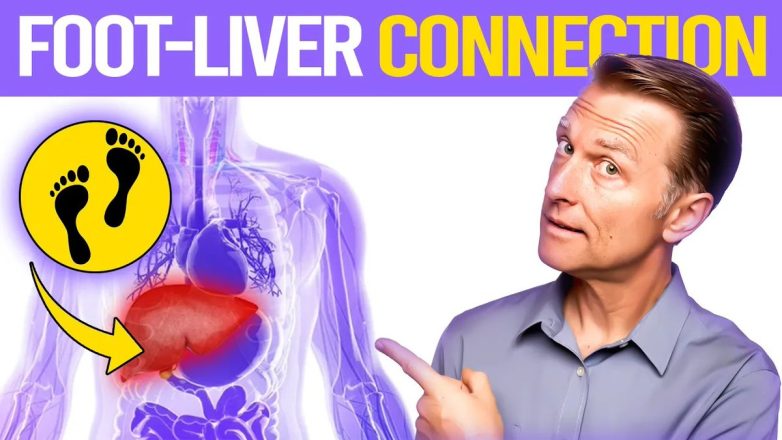
“Your Feet Speak: Shocking Signs of Liver Trouble Revealed!”
liver health indicators, foot symptoms of liver dysfunction, natural liver support tips
Understanding the Connection Between Foot Symptoms and Liver Health
Liver health is often overlooked when it comes to overall wellness, yet it plays a crucial role in bodily functions such as detoxification, metabolism, and nutrient storage. Surprisingly, your feet can provide vital clues about your liver’s condition. In this article, we will explore how certain foot symptoms can indicate liver dysfunction, what to avoid to maintain liver health, and the best natural methods to support your liver.
Common Foot Symptoms Related to Liver Health
1. **Cracked Heels**: One of the primary signs of liver issues can manifest as dry, cracked heels. This condition occurs due to the liver’s inability to adequately filter toxins, leading to dehydration in the skin. If you notice persistent cracked heels, it might be wise to evaluate your liver health.
2. **Purple Spots**: Also known as petechiae, these small, purple or red spots can appear on the skin and are a result of blood vessel leakage. When the liver is not functioning correctly, it may not produce enough clotting factors, leading to noticeable spots on your feet or other areas of the body.
3. **Burning Sensations**: A burning sensation in the feet can be another warning sign of liver dysfunction. This symptom might arise from nerve damage, often linked to liver disease. If you’re experiencing unexplained pain or discomfort, it’s essential to consult a healthcare professional.
4. **Swelling**: Liver problems can cause fluid retention, resulting in swollen feet and ankles. This condition, known as edema, occurs when the liver cannot produce enough albumin, a protein that helps maintain fluid balance in the body.
5. **Yellowing of the Skin**: Known as jaundice, this symptom can affect the skin and the whites of the eyes. While not exclusive to the feet, jaundice can indicate serious liver issues and should be addressed immediately.
What to Avoid for Better Liver Health
Understanding what to avoid can be just as important as knowing what to look for. Here are some common pitfalls that can lead to liver problems:
1. **Excess Alcohol Consumption**: One of the most significant contributors to liver damage is excessive alcohol intake. Limiting alcohol can significantly reduce your risk of developing liver disease and improve overall liver function.
2. **Unhealthy Diet**: A diet high in processed foods, sugars, and unhealthy fats can strain the liver. Focus on a balanced diet rich in fruits, vegetables, whole grains, and lean proteins to support liver health.
3. **Toxic Substances**: Exposure to environmental toxins, including pesticides, heavy metals, and chemicals, can adversely affect liver function. Take steps to minimize exposure by opting for natural products and ensuring good ventilation in your home.
4. **Medications**: Some medications can be harsh on the liver. Always consult with your healthcare provider about potential side effects and discuss any concerns regarding the medications you’re taking.
Natural Ways to Support Your Liver
Supporting your liver through natural methods can enhance its functionality and promote overall health. Here are some effective strategies:
1. **Stay Hydrated**: Drinking plenty of water is fundamental for good liver health. Adequate hydration helps the liver flush out toxins and perform its functions effectively.
2. **Incorporate Liver-Friendly Foods**: Foods such as leafy greens, cruciferous vegetables (like broccoli and cauliflower), and beets can help detoxify the liver. Consider adding foods rich in antioxidants and vitamins, such as berries, nuts, and fatty fish.
3. **Herbal Supplements**: Certain herbs, like milk thistle, dandelion root, and turmeric, have been shown to support liver health. These supplements can help protect liver cells and promote regeneration.
4. **Regular Exercise**: Engaging in regular physical activity can improve circulation, reduce stress, and help maintain a healthy weight, all of which contribute to better liver health.
5. **Limit Sugar and Processed Foods**: Reducing sugar intake and avoiding processed foods can significantly benefit liver function. Instead, opt for whole, unprocessed foods that offer essential nutrients.
6. **Practice Stress Management**: Chronic stress can negatively impact liver health. Incorporating relaxation techniques such as yoga, meditation, or deep breathing exercises can help reduce stress levels and support overall wellness.
Conclusion: Listening to Your Feet for Liver Health
Your feet can offer valuable insights into your liver health. By understanding the signs and symptoms linked to liver dysfunction, you can take proactive steps to maintain a healthy liver. Avoiding harmful substances, embracing a balanced diet, and incorporating natural remedies can significantly enhance liver function.
If you notice any concerning foot symptoms or have questions about your liver health, consult with a healthcare professional for personalized guidance. Taking care of your liver is essential for overall well-being, and the journey starts with awareness and proactive measures. Remember, a healthy liver contributes to a healthier, happier life!
For more insights and detailed information about liver health and its connection to foot symptoms, visit Dr. Eric Berg’s Twitter [here](https://twitter.com/dr_ericberg/status/1930703189742854620?ref_src=twsrc%5Etfw).

Your feet can reveal surprising clues about your liver health.
From cracked heels to purple spots and burning sensations, these foot symptoms may signal liver dysfunction.
Learn the signs, what to avoid, and the best natural ways to support your liver.https://t.co/hufwoW9uIC pic.twitter.com/CCCT3Vl1dB
— Dr. Eric Berg (@dr_ericberg) June 5, 2025
Your Feet Can Reveal Surprising Clues About Your Liver Health
Did you know that your feet can tell you a lot about your liver health? It sounds a bit strange, right? But believe it or not, things like cracked heels, purple spots, and even burning sensations can be indicators of liver dysfunction. If you’re curious about how your tootsies might be hinting at something deeper, stick around! We’re diving into the signs of liver issues, what to avoid, and the best natural ways to support your liver.
Understanding the Connection Between Feet and Liver Health
Your liver is a powerhouse organ responsible for detoxifying your blood, producing bile, and storing essential nutrients. When it’s functioning well, you feel great! But if it’s struggling, you might notice some unusual symptoms, particularly in your feet. This connection is all about how your body communicates distress.
For instance, when your liver isn’t processing toxins properly, these toxins can accumulate and manifest in various ways, including skin issues on your feet. So, let’s break down what these symptoms might look like and what they could mean for your liver health.
Common Foot Symptoms Indicating Liver Dysfunction
Here are some common foot symptoms that could suggest your liver is in distress:
1. Cracked Heels
Cracked heels can be a sign of dehydration or a vitamin deficiency, but they can also indicate liver problems. The liver plays a huge role in maintaining healthy skin, and if it’s not functioning well, you might notice dry, flaky skin on your feet. This can lead to cracking, which is not only uncomfortable but can also become infected.
2. Purple Spots
Have you noticed any unusual purple spots on your feet? These could be a sign of poor blood circulation or even liver disease. When your liver is struggling, it can affect your blood’s ability to clot properly, leading to easy bruising or spots. If you see these, don’t ignore them; it’s best to consult with a healthcare professional.
3. Burning Sensations
A burning sensation in your feet can be linked to various conditions, including liver issues. This sensation often signals nerve damage, which can occur when your liver isn’t detoxifying your blood effectively. If you’re experiencing this, it’s worth discussing with your doctor.
What to Avoid for Better Liver Health
Now that we’ve covered some signs to watch out for, let’s chat about what you might want to avoid to keep your liver happy and healthy.
1. Excessive Alcohol Consumption
Alcohol is one of the biggest culprits when it comes to liver damage. Consuming too much can lead to fatty liver disease, hepatitis, or even cirrhosis. If you love your liver, moderation is key!
2. Processed Foods
Processed foods are often high in unhealthy fats, sugars, and additives that can put a strain on your liver. These foods can lead to fat accumulation in the liver, impairing its function over time. Opt for whole foods where possible.
3. Ignoring Medications
Some medications, especially over-the-counter pain relievers like acetaminophen, can be hard on your liver if taken in excess. Always follow the dosage instructions and consult with your doctor if you’re unsure.
4. Poor Hydration
Your liver needs water to function optimally. Dehydration can lead to a buildup of toxins in your body, stressing your liver. Aim for at least 8 glasses of water a day to keep everything flowing smoothly.
Natural Ways to Support Your Liver
Taking care of your liver doesn’t have to be complicated! Here are some natural ways you can support this vital organ:
1. Eat a Healthy Diet
Focus on a diet rich in fruits, vegetables, whole grains, and lean proteins. Foods like leafy greens, beets, and avocados are particularly beneficial for liver health. They help detoxify your body and provide essential nutrients.
2. Stay Hydrated
As mentioned earlier, drinking plenty of water is crucial. It helps flush out toxins and supports overall body functions. Consider adding lemon to your water for an extra detox boost!
3. Exercise Regularly
Exercise is essential for maintaining a healthy liver. Regular physical activity helps reduce liver fat, improves blood flow, and supports weight management. Whether it’s a brisk walk, yoga, or hitting the gym, find something you enjoy!
4. Consider Herbal Remedies
Some herbs, like milk thistle and dandelion root, are known for their liver-supporting properties. These can help enhance liver function and promote detoxification. Always check with a healthcare provider before starting any new supplements.
5. Manage Stress
Believe it or not, stress can impact your liver health! High stress levels can lead to unhealthy habits like overeating or drinking, which can harm your liver. Try incorporating stress-reducing practices like meditation, deep breathing exercises, or even spending time in nature.
When to See a Doctor
If you’re experiencing any of the symptoms mentioned earlier, like cracked heels, purple spots, or burning sensations, it’s crucial to consult with a healthcare professional. They can perform tests to evaluate your liver function and provide personalized advice based on your situation.
Wrapping It Up
Your feet can indeed offer surprising clues about your liver health. By paying attention to symptoms like cracked heels, purple spots, and burning sensations, you can take proactive steps toward better health. Remember to avoid excessive alcohol, processed foods, and stay hydrated!
Support your liver naturally through a well-rounded diet, regular exercise, and stress management. And always consult with a healthcare professional if you notice any concerning symptoms. Your liver will thank you!
For more information on liver health, check out the resources from Healthline and NCBI.
Your feet can reveal surprising clues about your liver health. From cracked heels to purple spots and burning sensations, these foot symptoms may signal liver dysfunction. Learn the signs, what to avoid, and the best natural ways to support your liver.